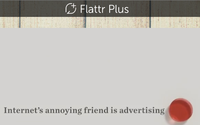 In the rapidly shape-shifting world of digital advertising and content gatekeepers, one of the world’s most distributed ad-blocking platforms has teamed up with a
“microdonations” service to launch a new variant that will enable users to “frictionlessly” pay publishers with tiny micropayments while they are browsing their pages.
In the rapidly shape-shifting world of digital advertising and content gatekeepers, one of the world’s most distributed ad-blocking platforms has teamed up with a
“microdonations” service to launch a new variant that will enable users to “frictionlessly” pay publishers with tiny micropayments while they are browsing their pages.
That’s the announcement being made this morning by Europe’s Adblock Plus and Flattr, which are coming together to form Flattr Plus, a mashup they claim will “let hundreds of
millions of users directly and sustainably fund content they love -- without reliance on ads, paywalls or paying for single articles.”
What wasn’t clear from the
announcement, or Flattr Plus’ sign-up page, is exactly how that would be funded, but it appears that it is merely a cross-promotional platform based on Flattr’s core model of having users
fund micropayments to publishers from their own financial accounts -- but presumably more seamlessly by utilizing AdBlock Plus’ browser plug-in technology.
advertisement
advertisement
The collaboration
comes as others are exploring different variants that would redirect revenues generated from “whitelisted” advertisers to consumers and publishers, such as Brendan Eich’s new
browser-based platform Brave.
It was not clear from any of the information released on Flattr Plus whether any revenue generated by Adblock Plus
whitelisting ads to its users would go toward those micropayments, but the coming together of an ad-blocking and a publisher donations platform at least suggests that the worlds of advertising, ad
blocking/whitelisting, and publisher micropayments are fusing in new and unexpected ways as the advertising and publishing industries try to develop new models to sustain a rapidly shifting
marketplace.
The Adblock Plus and Flattr collaboration, meanwhile, will likely add more confusion to an already blurry marketplace, and at the very least will tacitly promote an
anti-advertising sentiment.
A launch video on Flattr Plus’ signup site uses an adorably perky and upbeat approach to ad-bashing, ironically leveraging a Madison Avenue-like
jingle to accompany copy that effectively says advertising is now irrelevant to the digital media economy.
“We all know that guy who is a bit annoying, but always
around,” the copy reads, adding: “In your class, workspace, soccer team. He’s not necessarily evil, but no one likes him.
“Once in awhile, he brings some good
ideas, maybe even a smile. But he still annoys you. When you grow up, you realize you don’t need him. You choose otherwise and you life feels a bit less… annoying.
“The
Internet’s annoying friend is advertising. He’s not evil. But no one really likes him.”